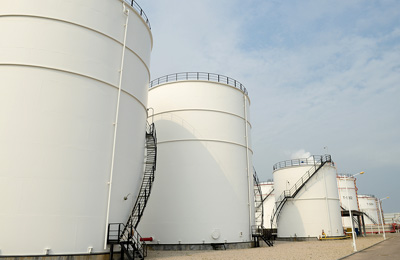
Iran targets refining capacity of 3 million bpd by 2018
DUBAI, September 3, 2014
Iran hopes to boost its oil refining capacity to 3 million barrels per day by 2018 from 1.9 million now with the opening of new refineries as the Opec member seeks to reduce its dependency on imports of oil products, Iranian media reported.
Iran has had to increase its refining capacity over the past few years due to Western efforts to prevent it from importing fuel as part of sanctions over Tehran's nuclear activities.
Refinery capacity expansions and government efforts to curb fuel use have cut Iran's imports over the last three years. Iran had said it wants to become a major fuel exporter.
"Iran's crude oil refining capacity is to reach 3 million barrels per day in four years as the Petroleum Ministry plans to sell petroleum products rather than crude oil," Iran's oil ministry website Shana reported.
The construction of the Persian Gulf Star refinery in Bandar Abbas will raise Iran's crude refining capacity to over 2.2 million bpd, the semi-official Fars news agency cited Abbas Kazemi, managing director of National Iranian Oil Refining and Distribution Co. as saying.
Iranian Oil Minister Bijan Zanganeh was cited by Shana last month as saying the goal is to start up the first unit of the Persian Gulf Star refinery by the first half of 2015 and to become fully operational in 2016. Its gasoline production capacity is 36 million litres per day, he said.
"Over the past five years, we have been importing such products as gasoil, gasoline, liquefied gas and even fuel oil. We have reached self-sufficiency in all these products except for gasoline," Fars quoted Kazemi as saying.
Shana has also cited Zanganeh as saying Iran is looking at projects for heavy crude refining and that one project being envisaged in Jask or Bandar Abbas in southern Iran. Iran also plans to build eight 60,000-barrel refineries in four years to cover the country's need for condensate, he added.
Separately, Kazemi told Shana Iran plans to revive plans for the construction of the 150,000 bpd Anhita oil refinery in the western province of Kermanshah. He did not give a time line when the refinery will be operational.
Iran has been trying to side-step sanctions on its oil industry by becoming self-sufficient in gasoline production as it produces only 60 percent of its domestic gasoline demand and imports the remaining 40 percent from friendly powers.
Iran has rationed gasoline for private motorists since December 2010. Zanganeh has said current average gasoline consumption in Iran is around 70 million litres per day. – Reuters







